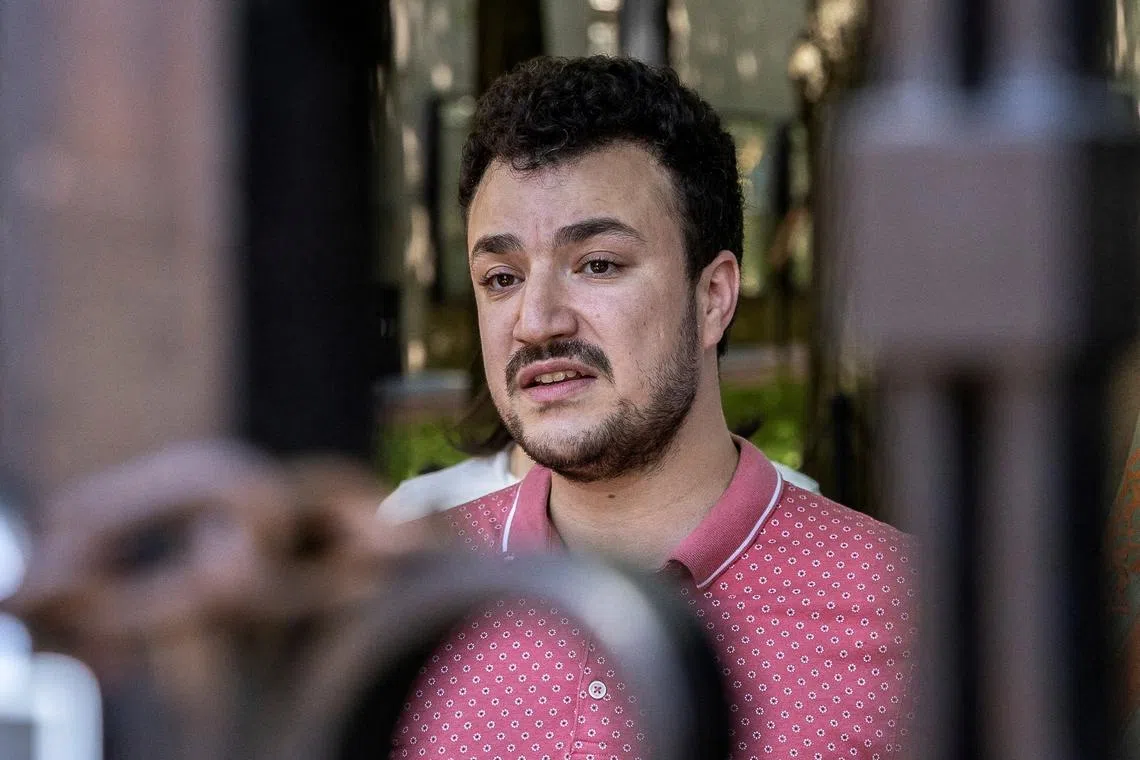Columbia student protester’s arrest prompts federal court showdown
Sign up now: Get ST's newsletters delivered to your inbox

Mr Khalil was a prominent activist at Columbia, which experienced some of the biggest protests against Israel’s military assault on Gaza.
PHOTO: REUTERS
Follow topic:
NEW YORK - A legal battle over an arrested Palestinian activist and Columbia University student
US District Judge Jesse Furman in Manhattan temporarily blocked the authorities on March 10 from deporting Mr Mahmoud Khalil, 29, and scheduled a hearing for March 12. Mr Furman asked lawyers for the administration to respond by 5pm on March 11 with their suggestions as to what he should do.
The case could ultimately test where immigration courts draw the line between protected free speech and support for groups the United States calls terrorists, as US President Donald Trump seeks to fulfill his promise to deport some foreign students involved in the pro-Palestinian protest movement.
Mr Khalil was a prominent activist at Columbia, which experienced some of the biggest protests against Israel’s military assault on Gaza that followed Hamas’ October 2023 attack. Washington has designated Hamas a foreign terrorist organisation.
The Hamas attack killed 1,200 people, according to Israeli tallies, and Israel’s military campaign has killed over 48,000 Palestinians, according to the Gaza health ministry.
Mr Trump branded Mr Khalil on social media
White House spokeswoman Karoline Leavitt accused Mr Khalil on March 11 of “siding with terrorists,” and said Secretary of State Marco Rubio had the right to revoke permanent residency status for adversaries of US foreign policy and national security interests.
“This administration is not going to tolerate individuals having the privilege of studying in our country and then siding with pro-terrorist organisations,” Ms Leavitt told reporters.
Ms Leavitt said flyers with Hamas’ logo were distributed at “group protests” she said Mr Khalil had organised, but did not accuse him of distributing the flyers himself. Ms Leavitt did not present evidence of Mr Khalil’s involvement.
Mr Khalil’s lawyers did not immediately respond to a request for comment on Ms Leavitt’s remarks. In court papers, his lawyers have described him as a “mediator and negotiator” and said his advocacy for Palestinians was protected speech under the US Constitution’s First Amendment.
Columbia’s administration has said that Mr Khalil was one of the lead negotiators with the school on behalf of the protesters about their demands to end investments of Columbia’s US$14.8 billion (S$19.69 billion) endowment in weapons manufacturers and other companies that support Israel.
Mr Furman is expected to consider whether Mr Khalil's arrest on March 8 by Department of Homeland Security agents outside Columbia student housing was illegal, as his lawyers assert.
While the judge has the authority to order Mr Khalil released from detention if he finds his rights were violated, deportation proceedings could nonetheless continue in a separate immigration court, said Mr Daniel Kanstroom, a professor at Boston College Law School.
Demonstrators on the streets of New York City, Democratic lawmakers, and the United Nations Special Rapporteur on the Occupied Palestinian territories condemned the arrest.
“This lawless abuse of power and political repression is a threat to all Americans,” 14 Democratic members of Congress, including Palestinian American US Congresswoman Rashida Tlaib, wrote in a letter on March 11 to Homeland Security Secretary Kristi Noem.

Demonstrators attend a protest near the City Hall, following the arrest of Mr Khalil, on March 11.
PHOTO: REUTERS
Police and hundreds of protesters briefly clashed in lower Manhattan on March 10 and at least one person was detained, according to a Reuters witness. Protests continued near Manhattan college campuses on March 11.
“His arrest is a very, very alarming escalation in what’s already an alarming assault on civil liberties,” Mr Danny Katch, an English teacher at City College of New York, told Reuters at a protest at the school’s uptown Manhattan campus.
Green card holder
Mr Khalil, a Palestinian raised in Syria, arrived in the United States on a student visa in 2022 to pursue a graduate degree in public administration, his lawyers said.
He became a lawful permanent resident – or green card holder – in 2024, according to his lawyers. A green card permits a person to permanently reside in the United States and gives them the protections of the US Constitution, including to free speech under the First Amendment.
Mr Rubio said on X on March 9 that the government would be revoking visas and green cards of those supporting Hamas
Legal experts say the government would need to prove to an immigration judge that Mr Khalil should be deported by clear, convincing and unequivocal evidence – a higher standard than many civil cases but lower than the standard needed to convict someone of a crime.
It would be up to an immigration judge – not Mr Furman – to determine whether Mr Khalil had engaged in activity that would justify his removal from the United States, said Mr Kevin Johnson, dean of the University of California, Davis School of Law.
Mr Khalil would have the right to appeal an unfavourable ruling, and the case could take years. REUTERS

